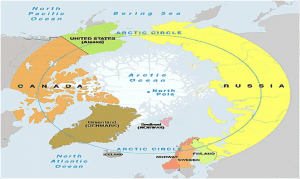THE CONTEXT: The impacts of climate change are disproportionately affecting the Global South, and the melting Arctic is no exception. As India takes greater steps towards leading the Global South, it should involve pushing for reforms and ensuring that climate protection is at the forefront of global Arctic policymaking.
ISSUES IN THE ARCTIC REGION:
- Rapid warming of ice: The Arctic is warming at a rate four times faster than the global average, leading to an unprecedented loss of sea ice, as well as the thawing of permafrost. It can lead to unleashing of vast quantities of stored carbon and emissions which can trigger multiple catastrophic and irreversible climate tipping points.
- Affect Indian monsoon: Recent research shows an intricate correlation between the melting of Arctic sea ice and extreme rainfall events during the Indian summer monsoon. Warming of Arctic can affect the monsoon which is crucial to agriculture and livelihoods of South Asia.
- Commercialization of Arctic region: Despite awareness about the importance of the Arctic, the climatic challenge is being exacerbated by rapid development and growing geopolitical tensions. For example, Russia is pouring resources into commercialising and expanding trade channels along the Northern Sea Route which signals its interest in short-term commercial exploitation, not long-term climate preservation. Other Arctic countries are also planning oil and gas development endeavours.
- Suspension of Arctic Council: The suspension of the Arctic Council due to the Russian invasion of Ukraine has made it more difficult to hold countries accountable and to monitor wider activity contributing to changes in the Arctic. Also, the Arctic Council does not prohibit the commercial exploitation of resources in the Arctic. It only seeks to ensure that it is done in a sustainable manner without harming the interests of local populations and in conformity with the local environment.
WHAT IS ARCTIC COUNCIL?
- Arctic Council was created with the signing of the Ottawa Declaration on 19 September 1996 in Canada and is mandated to protect the Arctic environment.
- Its eight members include: Canada, Denmark, Finland, Iceland, Norway, Russia, Sweden and United States.
- The standing Arctic Council Secretariat is located in Tromsø, Norway.
- It aims to promote cooperation, coordination and interaction among the Arctic States together with the indigenous communities and other Arctic inhabitants.

INDIA AND THE ARCTIC
- India holds one of the 13 positions as the Observer in the Arctic Council.
- India’s interests in the Arctic region are scientific, environmental, commercial as well as strategic. India launched its first scientific expedition to the Arctic Ocean in 2007.
- It opened a research base named “Himadri” at the International Arctic Research Base at Ny-Alesund, Svalbard, Norway in July 2008 for carrying out studies in disciplines like Glaciology, Atmospheric sciences & Biological sciences.
- In July 2018, the Ministry of Earth Sciences renamed the “National Centre for Antarctic and Ocean Research” to the “National Centre for Polar and Ocean Research.” It is a nodal organisation coordinating the research activities at the stations at the poles.
- In March 2022, the Ministry of Earth Science has unveiled India’s Arctic Policy, titled ‘India and the Arctic: building a partnership for sustainable development’.
THE WAY FORWARD
- Need for collective action: As impacts in one region can affect the rest of the world, therefore, consensus-based collective action to mitigate climate impacts in the Arctic is much needed.
- Expansion of Arctic Council: The Council does not have any member from the Global South, though some, including India, have observer status. There is a need of inclusion of more members from the global south as they are the most vulnerable to climate change.
- India’s role: The active involvement of India as a member of the Arctic Council to voice the environmental concerns can push for an end to further exploitation. India has ability to balance the aspirations of both Global North and Global South, as evidenced at the G20 Summit. It holds the potential to forge a united approach to safeguarding crucial global ecosystems, especially the Arctic. Also, to stay relevant in the Arctic region, India should take advantage of the observer status it has earned in the Arctic Council and consider investing more in the Arctic.
- Treat as global common: Instead of creating a potential battleground in the Arctic region, the parties concerned should utilise their expertise and create the required synergy to achieve shared goals. The Arctic region should also be treated as a global common like the Antarctic region, and a treaty on similar lines should be signed to protect the region.
THE CONCLUSION:
The protection of the Arctic region is, therefore, crucial to protect the world from the worst effects of the climate emergency. There is a need to generate unanimity to reform Arctic governance and protect the climate, and the countries involved should have a long-term vision and strategic goals as compared to immediate short-term gains.
PREVIOUS YEAR QUESTIONS
Q.1 What are the main functions of the United Nations Economic and Social Council (ECOSOC)? Explain different functional commissions attached to it. (2017)
Q.2 Discuss the impediments India is facing in its pursuit of a permanent seat in the UN Security Council. (2015)
MAINS PRACTICE QUESTION
Q.1 Rising geopolitical tensions and environmental challenges have made the Arctic region an important concern for humanity. Discuss the role of Arctic Council in addressing these tensions and challenges.
Q.2 Critically examine the role which India can play to preserve and protect the integrity of the Arctic region from international politics and environmental concerns.
Spread the Word



